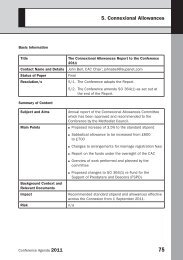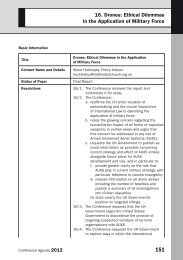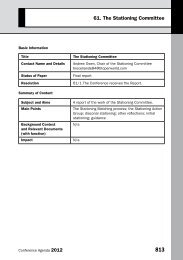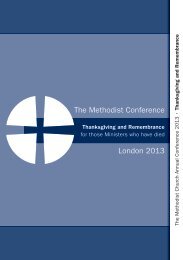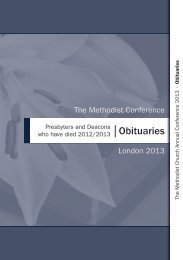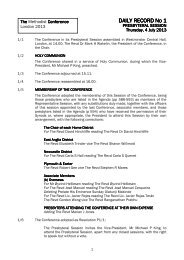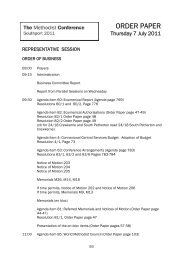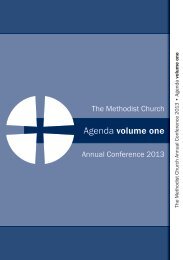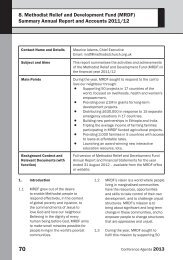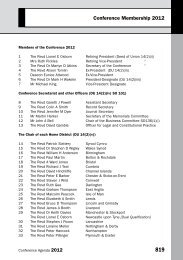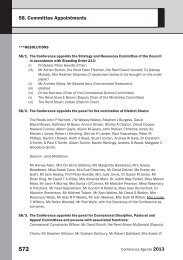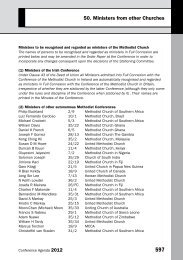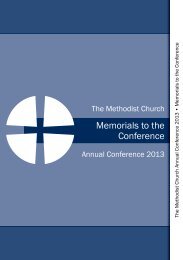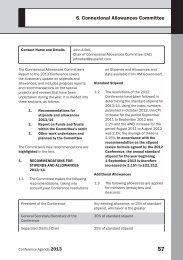Agenda Volume 3 - Methodist Conference
Agenda Volume 3 - Methodist Conference
Agenda Volume 3 - Methodist Conference
You also want an ePaper? Increase the reach of your titles
YUMPU automatically turns print PDFs into web optimized ePapers that Google loves.
57. The Fruitful Field Project<br />
don, was training female teachers.<br />
Also a partnership in Birmingham was<br />
allowing some <strong>Methodist</strong> missionaries<br />
to be trained at Kingsmead College;<br />
Guy Chester’s first gift of land in<br />
Muswell Hill in London is only a few<br />
years away; and Hilda Porter’s vision<br />
of a <strong>Methodist</strong> International House in<br />
London is surely in gestation.<br />
79 The late 1960s and early 1970s were<br />
years of significant change for institutions<br />
forming student ministers. The<br />
1967 <strong>Conference</strong> closed Headingley<br />
College, merging its activities with<br />
those of Didsbury College, already<br />
relocated from Manchester to Bristol.<br />
The 1971 <strong>Conference</strong> approved a<br />
merger of Handsworth College and<br />
the Queen’s College (an Anglican<br />
theological college), to establish what<br />
is now known as the Queen’s<br />
Foundation for Ecumenical Theological<br />
Education. Finally, the 1972<br />
<strong>Conference</strong> elected to close Hartley<br />
Victoria College.<br />
80 Though the site of Hartley Victoria<br />
was sold, the College itself<br />
maintained an existence through a<br />
pioneering relationship with the Free<br />
Churches in Manchester. Luther King<br />
House Educational Trust, of which<br />
Hartley Victoria College now forms<br />
a part, was the first in a series of<br />
ecumenical ventures in which the<br />
<strong>Methodist</strong> Church participated, which<br />
saw new forms of education for<br />
student ministers – pathways which<br />
largely did not rely on residence in a<br />
college community. This development<br />
led to a proliferation in the number<br />
of institutions sponsored by the<br />
<strong>Methodist</strong> Church for the delivery of<br />
pathways for student ministers. In<br />
1955, six colleges educated student<br />
ministers. By 2005, 20 institutions<br />
were being used by the Church to<br />
educate student ministers – 2 of<br />
them recently established by the<br />
<strong>Methodist</strong> Church itself, in the form<br />
of the Wesley Study Centre in Durham<br />
and the York Institute for Community<br />
Theology.<br />
81 Major decisions about our learning<br />
institutions were made by the 2007<br />
<strong>Conference</strong> (the 2006 <strong>Conference</strong><br />
having rejected proposals brought for<br />
its consideration). The decision of the<br />
2007 <strong>Conference</strong> located full-time,<br />
bursaried student ministers at three<br />
institutions (the 2006 <strong>Conference</strong><br />
having been asked to locate such<br />
pathways at only two institutions).<br />
The most recent decision of the <strong>Conference</strong><br />
in this context was the decision<br />
of the 2010 <strong>Conference</strong> to close<br />
Wesley College, Bristol.<br />
82 Today’s distribution of <strong>Methodist</strong>sponsored<br />
institutions, colleges and<br />
centres is as follows:<br />
Institutions receiving student<br />
ministers following full-time pathways<br />
82.1 The Queen’s Foundation, Birmingham:<br />
The Queen’s Foundation receives<br />
student ministers from the <strong>Methodist</strong><br />
Church and ordinands from the<br />
Church of England, the latter as<br />
full-time students and, in higher<br />
numbers, as part-time students from<br />
668 <strong>Conference</strong> <strong>Agenda</strong> 2012



